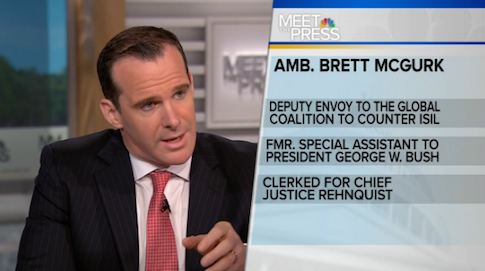The Obama administration official most likely in line to become the next U.S. envoy to the Coalition to Counter the Islamic State (IS, also known as ISIS or ISIL) has falsely presented himself as an official U.S. ambassador by the administration for the last five months, according to documents reviewed by the Washington Free Beacon.
Brett McGurk, a deputy special presidential envoy to the Global Coalition who serves under General John Allen, was temporarily appointed by the administration as an ambassador on Oct. 18, 2014.
He was conferred this rank through a little-known legal loophole that allows the administration to bypass congressional confirmation of an individual for a period of no longer than six months. Ambassadors confirmed by the Senate have the title for life.
McGurk’s temporary ambassadorship, which cannot be extended under U.S. law, ended in April of this year. Yet McGurk has continued to use the honorific when defending the administration’s Syria policy on television and print media.
Until last night when the Free Beacon contacted the State Department to inquire about the discrepancy, McGurk's official biography on the State Department website also falsely credited McGurk with the rank of ambassador.
State Department officials also have referred to him as "Ambassador McGurk" in press briefings well after the term of this title expired, the Free Beacon found.
Following multiple inquiries from the Free Beacon on Tuesday the State Department altered the website to remove the honorific.
McGurk was nominated in 2012 to serve as President Obama’s ambassador to Iraq. His appointment was withdrawn after the Free Beacon reported on a series of leaked emails sent from his official State Department account describing an intimate relationship with former Wall Street Journal reporter Gina Chon, who resigned her position as a result of the controversy.
At the same time, a State Department official who had served in Iraq during McGurk’s tenure hinted at the existence of a video purportedly showing a "State Department VIP on the roof of the Republican Palace in Baghdad receiving, um, pleasure of an oral nature from another State Department officer not his wife, or even his journalist mistress at the time."
The description was widely assumed to refer to McGurk.
Following that controversy, McGurk was appointed to a new, non-confirmable post as the administration’s deputy assistant secretary for Iraq and Iran.
In October 2014, the administration informed the Senate Foreign Relations Committee that it was temporarily conferring on him ambassador status. "This rank will not exceed six months," states a document submitted to the committee.
The title was conferred in order to give McGurk the "appropriate level of professional stature" and greater credibility on the international stage, the White House stated in the document.
In the months since the appointment expired, the administration has continued to refer to McGurk as an official ambassador.
In an Aug. 19 State Department press briefing, for instance, John Kirby referred to several meetings held by "Ambassador Brett McGurk." He is also listed on the State Department’s website "Ambassador Brett McGurk."
"Ambassador Brett McGurk" also appeared on the weekly news program Meet the Press in June and August, after his rank expired.
When introduced and identified both times as "ambassador" by then-host Chuck Todd, McGurk made no attempt to correct the record, transcripts show.
When asked to address the discrepancy on Tuesday, a State Department official acknowledged that the agency’s website had listed the wrong title.
"At the time of Brett McGurk's appointment as Deputy Special Presidential Envoy for the Global Coalition to Counter ISIL, the President also conferred the personal rank of ambassador," the official said. "While the primary appointment of Deputy Special Presidential Envoy remains current, we will update our website as we understand the personal rank was temporary and has now expired. We work hard to keep our websites up to date and regret when oversights occur."
One congressional aide familiar with the situation told the Free Beacon that the "State Department has been very vocal that he needs to be referred to as an ambassador."
The issue has raised further concerns among some who say that McGurk does not have the credibility to replace Gen. John Allen, the current envoy to the global coalition, when he steps down later this year.
Recent reports have indicated that "at least some of [Allen’s] responsibilities will fall to" McGurk when the four-star general leaves his post.
Now that McGurk’s term as an ambassador has expired, his ability to serve on behalf of the global coalition could be dramatically impaired, according to sources familiar with the situation.
"For someone who already has a history of poor judgment, the decision to falsely employ the title ‘ambassador’ may disqualify Mr. McGurk from future posts," said a second congressional source apprised of the situation.
The source said McGurk’s previous behavior in Iraq leaves him unfit to serve in such a senior and key position.
"These decisions have already sown serious seeds of doubt in his professionalism and character," the source said. "This major credibility problem is a product of his own creation."
